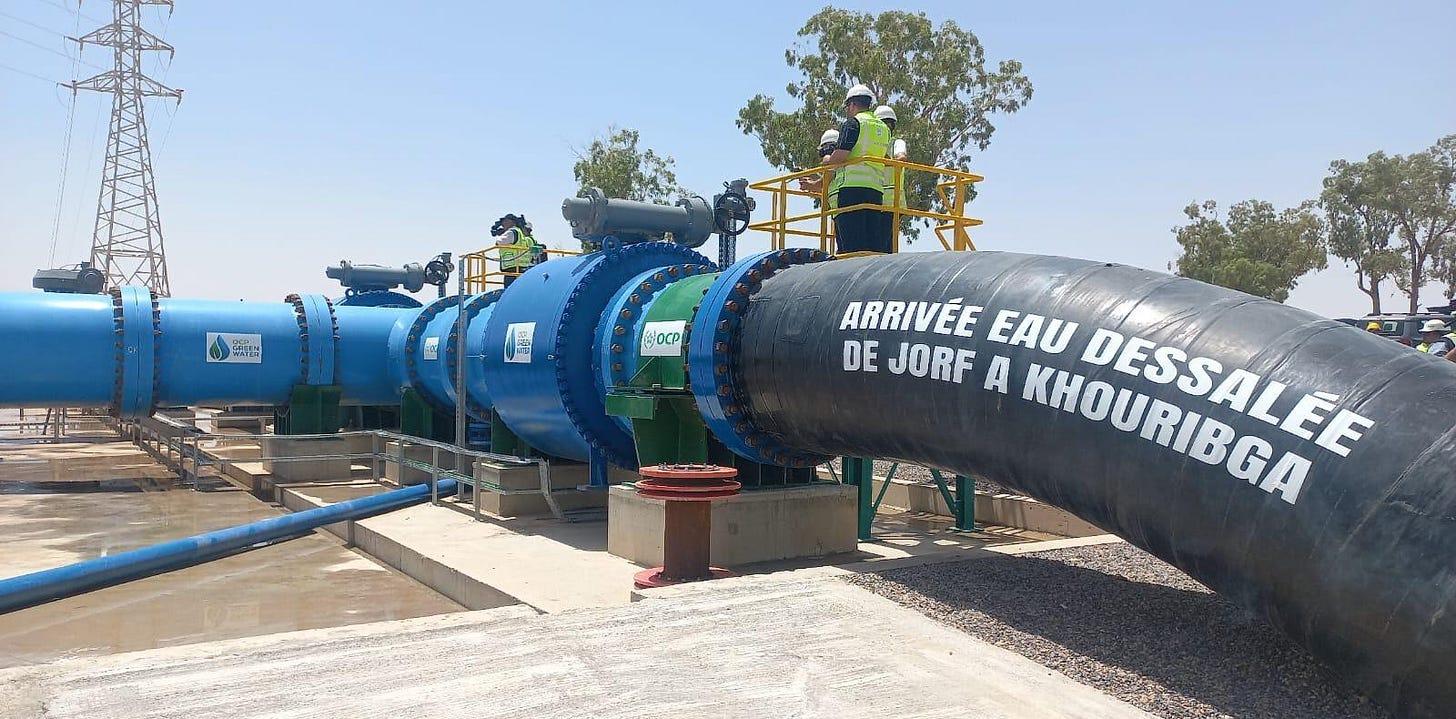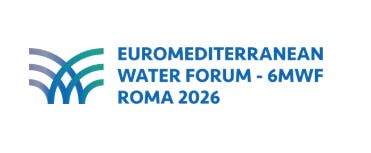Water in the Mediterranean
From reuse to digital innovation, regional cooperation and sustainable practices are shaping the future of water in the Mediterranean, and beyond.
I'm not usually a fan of the word masterclass—I believe we can all teach and learn from each other without being "masters."
But in this case, I’d say our guest came very close, delivering one of the best episodes so far.
This year I’ve learned a lot about Water and Agriculture thanks to Saturnino González. It’s a topic I’ve been crafting slowly. And today, he’s our sponsor for this edition.
Agualytics is transforming water management through innovation and technology. Based in Almería, Spain, they offer an intelligent platform that integrates IoT sensors, big data, and artificial intelligence to optimize the water cycle — especially in the agricultural sector.
Their systems help reduce water and energy consumption by up to 30%, detect leaks with precision, prevent breakdowns, and automate irrigation in real time. A perfect mix of sustainability and efficiency, empowering farmers and managers to make data-driven decisions.
It’s truly impressive the value they create.
Discover how they can help you at this link.
Alain Meyssonnier is one of the most inspiring and interesting water peers I’ve ever met.
I also admire him because, like me, he has erased the idea of "retirement" from his schedule.
Moving through Eaux de Marseille, Veolia, and beyond, his expertise is impressive, and yet he remains an invaluable asset to our industry, now leading the Institut Méditerranéen de l’Eau (IME).
He spent 20 years in international activities, primarily in Latin America, working in nearly every country except Paraguay and Uruguay. He also served as Deputy General Manager in charge of regional and international development for 8 years.
This is particularly significant in the Mediterranean, a region that is perhaps one of the most emblematic in terms of water management.
Here we see countries facing extreme droughts and floods, highly variable rainfall patterns, industrial and agricultural challenges, rapid population growth, aging infrastructure in some areas, and the urgent need for new infrastructure in others.
I encourage anyone to spend 60 minutes listening to Alain, the lessons are too many to fully capture here.
Key challenges and future in the Mediterranean
Demography as the Primary Impact: Alain argues that demography is the single biggest impact on water resources, as population growth drives demand for food (agriculture consumes 80% of Mediterranean water) and domestic use.
The Single Water Cycle: He advocates for moving away from the concept of "big" and "small" water cycles and recognizing there is only one global water cycle. This means that saving water in one country, like Spain, ultimately helps another, like Morocco, because the total amount of water on the planet is fixed.
Decentralized Solutions: For urban expansion, he champions decentralized wastewater treatment systems ("Small is Beautiful"). Treating and reusing water locally in new neighborhoods is often more efficient and less costly than expanding large, centralized infrastructure.
The Role of Youth: He strongly believes in involving young people in decision-making. He mentioned ensuring that a group of young engineers and political scientists presented the conclusions at the last Mediterranean Water Forum in Tunis, as they are the ones who will face the challenges of the next 50-60 years.
The unused treatment plants
To illustrate the problem of poorly planned infrastructure projects, Alain told a story about wastewater treatment plants being financed and built without the necessary network of pipes to bring wastewater to them.
He described how these brand-new plants are now with grease put around the motors to protect them from damage while they sit unused.
This anecdote serves as a cautionary tale about prioritizing construction over holistic operational planning and training.
The African market
To illustrate how some developing nations can "leapfrog" traditional technologies, Alain told a story about a trip to Africa.
He was in a market buying gifts and when he tried to pay with cash, the woman selling the items showed him a terminal and indicated she preferred a mobile payment. He had not seen that before in Europe.
He used this as an analogy for water management, suggesting that countries in Africa don't need to follow the same centralized infrastructure path as Europe and can move directly to more modern, decentralized solutions.
Why industry is adopting water reuse
Industry is decisively adopting water reuse and other conservation measures for a critical strategic reason:
Companies have begun to perceive water scarcity as a direct and significant risk to their business.
The primary motivations are:
Water is a Strategic Business Risk: Major industrial groups, whether in cosmetics, manufacturing, or mining, have realized that a lack of water poses a real threat to their production and, consequently, their economic survival. It has become a fundamental strategic issue.
Independence from External Sources: By implementing reuse and closed-loop systems, industries aim to reduce their dependence on municipal water networks and unpredictable climate conditions. They want to secure their own water supply, which is as vital as energy for their operations.
Examples of Industrial Leadership:
OCP in Morocco: The phosphate producer OCP is an extraordinary example. It has managed to stop consuming a single drop of water from natural sources. Currently, 30% of the water it uses comes from reusing treated wastewater from nearby cities, and the remaining 70% comes from desalination. The natural water they previously consumed is now available for other uses.
Michelin Worldwide: The tire manufacturer has a global target to reduce its water consumption by two-thirds (66%) by 2030.
Long-Term Profitability: Although the initial investments to reduce consumption and reuse water can be substantial, companies like Michelin have demonstrated that it is profitable in the long run. Reducing water consumption often leads to a reduction in energy use, creating a financial benefit.
The paradox of drip irrigation
Alain Meyssonnier explains that while drip irrigation is a technology designed for "sobriety," or water conservation, it has produced a paradoxical effect.
Higher Efficiency at the Micro Level: On a small scale, such as per square meter or per hectare, drip irrigation is highly efficient because it uses less water to irrigate a specific area.
Increased Consumption at the Macro Level: The paradox arises because this very efficiency has incentivized the expansion of cultivated land. Since farmers can achieve a greater economic impact with less water per hectare, they have started irrigating much larger areas than before.
The Final Outcome: As a result, even though each plant is watered more efficiently, the total water consumption in a region actually increases significantly because of the multiplied surface area under irrigation.
Therefore, the paradox is that a water-saving technology has ultimately led to an increase in overall water demand in agriculture, rather than a reduction.
Mediterranean Water Institute
The Mediterranean Water Institute (IME) is an institution with over 43 years of history, created to be "the voice of the water" in the region.
Its primary purpose is to serve as a platform for the exchange of both good and bad experiences in water management among the countries of the Mediterranean basin.
The work of the IME is guided by four fundamental priorities:
Know and Protect Natural Resources: Based on the principle that "to protect it, you must know it," especially groundwater, which accounts for over 90% of the Earth's freshwater.
Sobriety (Water Conservation): This involves promoting responsible water consumption, using only what is necessary. There is a notable trend of major industrial companies now treating water as a strategic business risk, leading them to implement significant water-saving measures and use non-conventional water sources.
Efficiency: This refers to optimizing all aspects of water management—operations, design, maintenance, and investment—to extend the lifespan of infrastructure.
The "Water Mix": Once the other priorities are addressed, the focus shifts to diversifying water sources, primarily through two non-conventional methods:
Reuse (Recycling): Recycling water for industry, agriculture, and cities is a key aspect.
Desalination: This is considered a final solution when other options are exhausted, with confidence that technology will help mitigate environmental concerns.
The Mediterranean Water Forum
The Mediterranean Water Forum is the main event organized by the IME every three years.
Date and Location: The next forum will take place in Rome from September 28 to October 2, 2026.
But on 6-7 November of 2025 is the Kick-Off in Barcelona. A first step towards Rome.
Key Collaboration: Since its second edition, the forum has been co-organized with the Union for the Mediterranean, which adds a political dimension to the event.
Political Significance: The Rome forum is particularly important as it will follow the planned signing of a new ministerial vision on water by the 43 member countries of the Union for the Mediterranean , which is also scheduled to happen in Rome in March 2026.
This reflects the potential for water to serve as an instrument of peace rather than conflict.
The central topics for the ministerial event and the forum will be:
The Water-Energy-Food-Ecosystem (WEFE) Nexus.
Financing and how to optimize it to ensure universal access to water.
The role of digitalization and Artificial Intelligence (AI) in water management.
Language barriers?
Speaking of Artificial Intelligence, language barriers have just collapsed.
Many people still don’t realize what this truly means: the world is changing in an impressive way.
In our case, we’re already publishing episodes in both Spanish and English to reach an international audience at all levels.
And as I mentioned in a previous article, if anyone finds language to be a barrier in a particular video, all they have to do is let us know:
We can now create the version in the language they prefer, thanks to AI.
Take this video as an example: it’s me speaking in Spanish… and also in English (with a version that actually sounds even better than my original speaking…not sure how to feel about this), Chinese, Arabic, …
Regardless of the current accuracy—which I’m validating with native speakers—the potential is clear: Artificial Intelligence is opening a new era where knowledge and experiences can be shared without borders.
If you don’t laugh at the video, I won’t believe you—it’s really funny.
Final quote
Applied to water, it means we need more people who are willing to act: willing to spread the word about water challenges, to connect communities, to bridge the gaps we face, and to learn by doing.
Waiting for the “perfect moment” or worrying too much about what others might think only delays progress.
Real impact comes when we stop talking about what should be done, and start doing it.
“The way to get started is to quit talking and begin doing.” — Walt Disney



